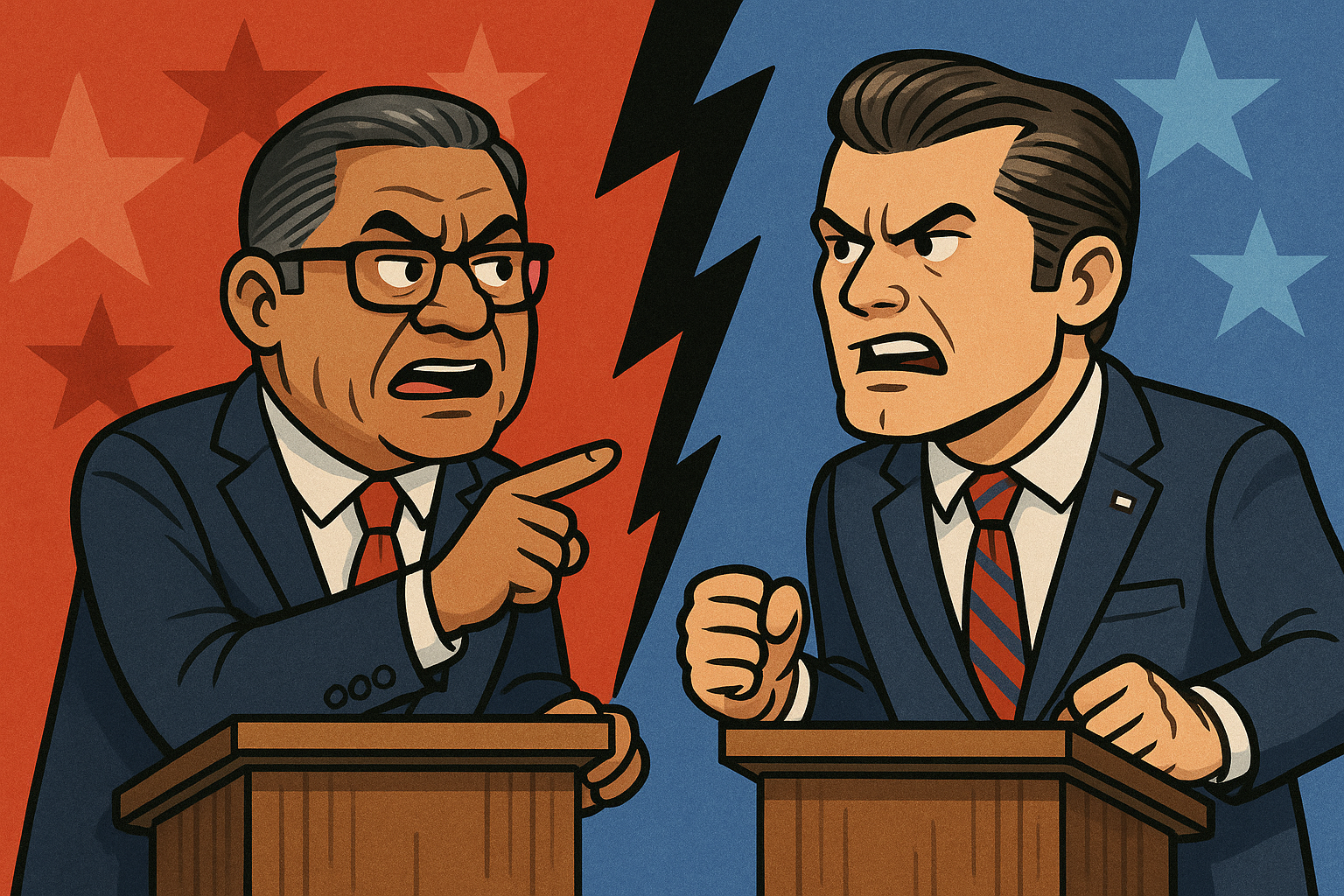American politics has always been full of strong voices and competing visions, but the divide feels sharper now than in decades past. On one side are leaders who believe in progressive reform, investing heavily in social programs and climate action.
On the other are conservative voices who argue for limited government, traditional values, and strong national defense. Two figures who embody this clash are Salud Carbajal, a California Democrat in Congress, and Pete Hegseth, a conservative veteran and Fox News commentator.
Their differences in policy and tone reflect more than just two individuals—they mirror the broader polarization shaping the nation.
This article dives deep into who these men are, what they believe, where their perspectives clash, and what their debates reveal about the current state of American politics.
Salud Carbajal and Pete Hegseth: A Clash of Perspectives on Policy and Politics
At first glance, Salud Carbajal and Pete Hegseth couldn’t seem more different. Carbajal represents California’s 24th District, a region known for its coastal communities, universities, and environmentally conscious voters.
Hegseth, on the other hand, made his mark as a decorated Army National Guard officer and later as a Fox News host, appealing strongly to conservative and military-minded audiences.
Where Carbajal speaks the language of compromise, incremental reform, and expanding opportunity, Hegseth often leans into sharp, unapologetic critiques of progressive policies.
The dynamic between them is not about personal rivalry, but rather a reflection of two deeply rooted visions for America’s future.
Who Is Salud Carbajal?
Early Life and Career
Salud Carbajal’s story begins with humble roots. Born in Mexico and raised in Oxnard, California, he grew up in a working-class family where hard work and perseverance were daily values.
His personal journey—from the child of farmworkers to a U.S. Congressman—is one that resonates with many immigrant families who see education and civic duty as the pathway to success.
After earning a degree from UC Santa Barbara, Carbajal served in the U.S. Marine Corps Reserve, an experience that shaped his respect for service and discipline. This military background gave him credibility when advocating for veterans later in his political career.
Rise in Politics
Carbajal began his political journey at the local level, serving on the Santa Barbara County Board of Supervisors. His leadership there earned him recognition as someone who could balance community needs with practical governance.
In 2016, he was elected to the U.S. House of Representatives, where he quickly became known as a pragmatic Democrat who emphasizes coalition building.
Policy Focus Areas
Carbajal’s legislative work centers on issues that reflect both his district and his values. He has championed:
- Environmental protection: advocating for renewable energy and climate action.
- Healthcare access: supporting the Affordable Care Act and efforts to reduce healthcare costs.
- Veterans’ issues: drawing from his own Marine Reserve service to push for stronger benefits and healthcare.
- Immigration reform: supporting pathways to citizenship and protections for Dreamers.
His approach is less about fiery rhetoric and more about producing results for his constituents.
Who Is Pete Hegseth?
Early Life and Military Service
Pete Hegseth grew up in Forest Lake, Minnesota, and his life was shaped early by service and patriotism. After attending Princeton University, he joined the Army National Guard, where he served tours in Iraq, Afghanistan, and Guantanamo Bay. His military service not only gave him firsthand experience of America’s foreign policy but also fueled his deep commitment to veterans’ issues and national security.
Media and Public Role
After his service, Hegseth transitioned into public life as a commentator and author. He gained national recognition as a co-host on Fox & Friends Weekend, where he built a reputation as a sharp critic of progressive policies and an unapologetic defender of conservative values. His media presence amplified his voice far beyond Minnesota, turning him into a household name among many right-leaning Americans.
Core Beliefs
Hegseth’s views are deeply influenced by his military background and his conservative ideology. He emphasizes:
- National security: arguing for strong defense spending and strict border policies.
- Veterans’ rights: often calling for reforms to make the VA more efficient.
- Limited government: pushing back against what he sees as excessive regulation.
- Traditional values: defending conservative cultural positions and criticizing progressive social policies.
While his critics see him as confrontational, his supporters value his directness and willingness to challenge the mainstream.
Where They Clash: Core Policy Differences
Immigration and Border Security
Immigration is one of the clearest dividing lines between Carbajal and Hegseth. Carbajal, shaped by his immigrant upbringing, argues for compassionate, comprehensive reform. He supports pathways to citizenship, protections for Dreamers, and humane enforcement policies.
Hegseth, by contrast, views immigration primarily through the lens of national security and economic stability. He pushes for stricter border control, supports physical barriers, and warns against what he sees as unchecked migration straining public resources. This clash reflects the broader Democratic–Republican divide on immigration.
Veterans and Military Policy
Both men care deeply about veterans but propose different solutions. Carbajal emphasizes expanding healthcare access, strengthening mental health programs, and ensuring resources are available in rural areas. His approach leans toward government investment and oversight.
Hegseth, drawing from personal frustrations with the VA system, often calls for reforms that reduce bureaucracy. He argues that efficiency and accountability should take priority over expanding programs that may add more red tape. While their goals overlap—supporting veterans—their strategies highlight the ideological gap between progressive expansion and conservative reform.
Environmental and Climate Policy
Few issues highlight the contrast between Carbajal and Hegseth more than environmental policy. Representing a coastal California district vulnerable to wildfires and rising sea levels, Carbajal has made climate change a top priority. He supports investments in renewable energy, stronger environmental protections, and legislation aimed at reducing carbon emissions. For him, environmental action is both a moral responsibility and an economic opportunity for green jobs.
Hegseth, however, is skeptical of climate change policies that he sees as economically disruptive. While not dismissing environmental stewardship entirely, he often criticizes proposals like the Green New Deal, arguing that they burden businesses and working families. His stance aligns with conservatives who emphasize economic growth and energy independence through traditional fuels such as oil and natural gas. This divergence represents a broader national debate: how much should America sacrifice in the short term to address long-term climate risks?
Healthcare
Healthcare is another sharp dividing line. Carbajal has consistently supported efforts to strengthen and expand the Affordable Care Act.
He views healthcare as a right, advocating for policies that reduce prescription drug prices, expand coverage, and protect people with preexisting conditions. His messaging often highlights the stories of constituents who rely on accessible healthcare.
Hegseth takes a different approach, framing healthcare reform around reducing government involvement. He argues that too much federal control creates inefficiency and reduces patient choice.
Instead, he supports market-driven solutions and often criticizes what he views as “one-size-fits-all” healthcare. For voters, this difference boils down to a fundamental philosophical divide: should healthcare be a guaranteed public good or a primarily private service shaped by competition?
The Debate Dynamic: How They Engage Each Other
Public Exchanges
While Carbajal and Hegseth may not debate one another face-to-face frequently, their public statements often clash in media coverage and commentary. Carbajal’s style is deliberate, rooted in policy detail and appeals to coalition-building.
Hegseth’s style is more combative, with sharp soundbites designed to resonate with audiences who crave clarity and conviction. When their perspectives intersect in public forums, the contrast is stark—pragmatism versus passion, detail versus directness.
Media Influence
Carbajal’s influence is strongest in his district and within Democratic policy circles, where his legislative work and speeches highlight progressive values tailored to local concerns.
Hegseth’s platform, on the other hand, is national. His presence on Fox News and other outlets gives him the ability to shape conservative narratives across the country. This media amplification means that even when discussing similar issues, Hegseth’s voice often reaches far wider audiences, framing him as a cultural warrior in addition to a policy commentator.
What Their Clash Reveals About American Politics
Two Sides of the Same Coin
The perspectives of Carbajal and Hegseth illustrate how America’s political divide has grown into a clash not only of policies but also of identities. Carbajal’s story of an immigrant rising to political office mirrors the progressive narrative of inclusion and reform.
Hegseth’s journey from the battlefield to the newsroom embodies the conservative emphasis on patriotism, tradition, and skepticism of government overreach. Together, their worldviews symbolize the larger struggle playing out in elections, legislatures, and living rooms nationwide.
Impact on Public Perception
Their differences also highlight how voters engage with leaders today. Some are drawn to Carbajal’s steady focus on issues like healthcare and climate, valuing detail and pragmatism.
Others prefer Hegseth’s firebrand delivery, which taps into emotional resonance and cultural identity. The clash underscores that politics is no longer just about policy proposals—it’s about the personalities and narratives that carry those policies forward.
Broader Cultural Context
Immigration, climate change, veterans’ affairs, and healthcare aren’t just policy debates—they’re cultural flashpoints. Carbajal’s support for immigration reform aligns with a vision of America as a nation of opportunity and inclusion.
Hegseth’s calls for stricter border controls resonate with concerns about national identity and security. Climate debates pit economic pragmatism against environmental urgency, while healthcare discussions reflect differing ideas of community responsibility.
Their opposing positions feed into larger culture wars shaping how Americans see themselves and their country’s future.
Lessons for Voters and Citizens
Politics often feels overwhelming, but the contrast between figures like Carbajal and Hegseth offers a valuable lesson. Democracy thrives when diverse perspectives are debated openly. For voters, the challenge is not to pick sides blindly but to understand what each perspective means for their lives, communities, and futures.
Carbajal’s approach shows the importance of incremental reform and representation of diverse voices. Hegseth’s approach demonstrates the appeal of direct, emotionally charged messaging that resonates with people’s sense of identity and tradition.
By listening to both, citizens can develop a more informed view of the challenges facing the nation. In the end, democracy is strengthened not by silencing opposing voices but by engaging with them critically.
Recap: Key Takeaways From the Clash Between Salud Carbajal and Pete Hegseth
- Salud Carbajal: progressive Democrat, immigrant background, focused on environment, healthcare, veterans, and immigration reform.
- Pete Hegseth: conservative veteran, Fox News host, emphasizes patriotism, limited government, and traditional values.
- Immigration: Carbajal pushes reform and pathways to citizenship; Hegseth demands stricter security and enforcement.
- Veterans’ issues: shared concern but different strategies—expansion of services vs. system reform.
- Climate policy: Carbajal prioritizes climate action; Hegseth warns of economic burdens.
- Healthcare: Carbajal supports expanded public access; Hegseth prefers market-based approaches.
- Debate style: Carbajal’s calm pragmatism contrasts with Hegseth’s direct, fiery rhetoric.
- Cultural context: Their perspectives embody broader national debates about identity, security, and values.
- Impact: Together, they reveal the sharp political polarization shaping America in 2025.







